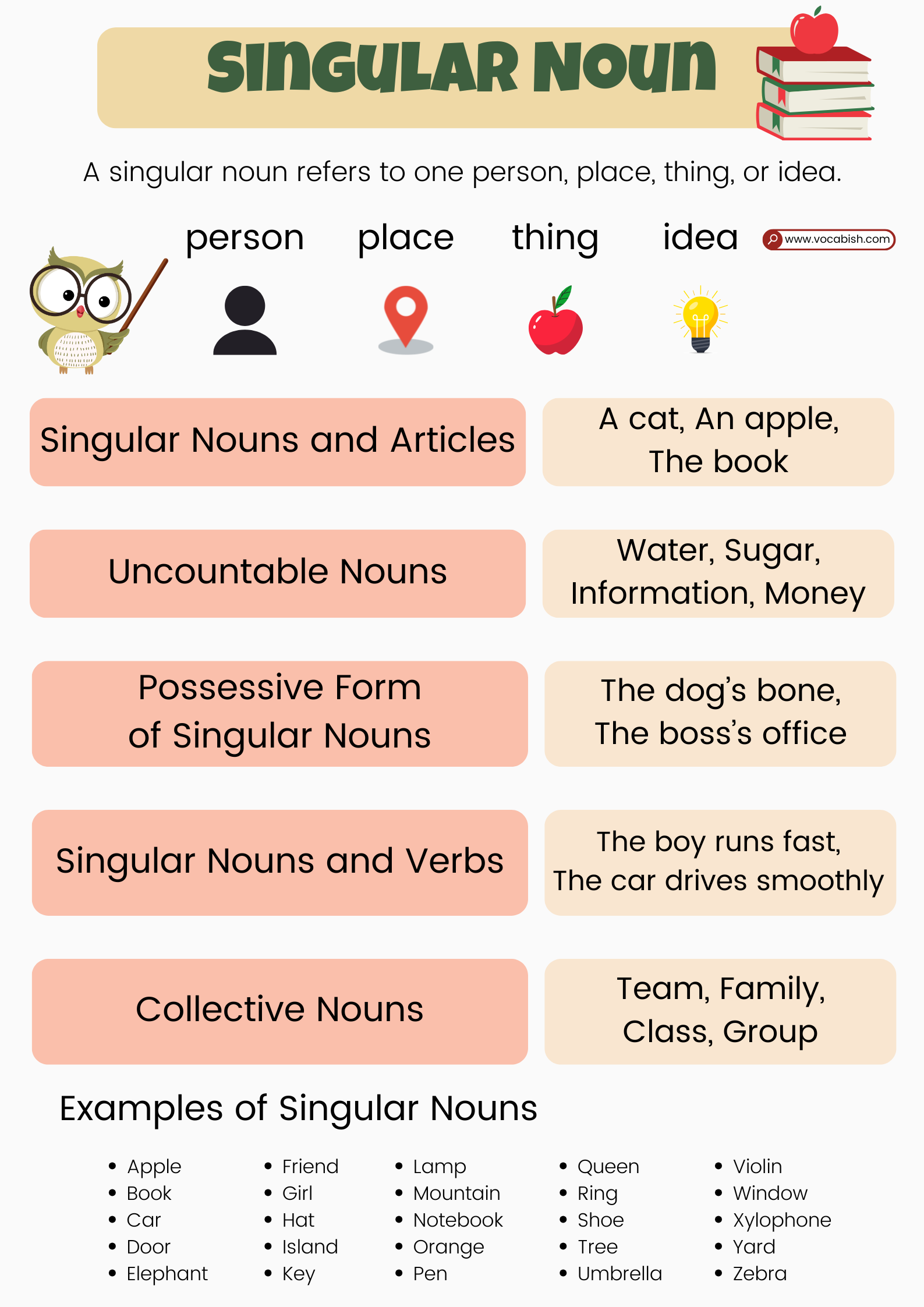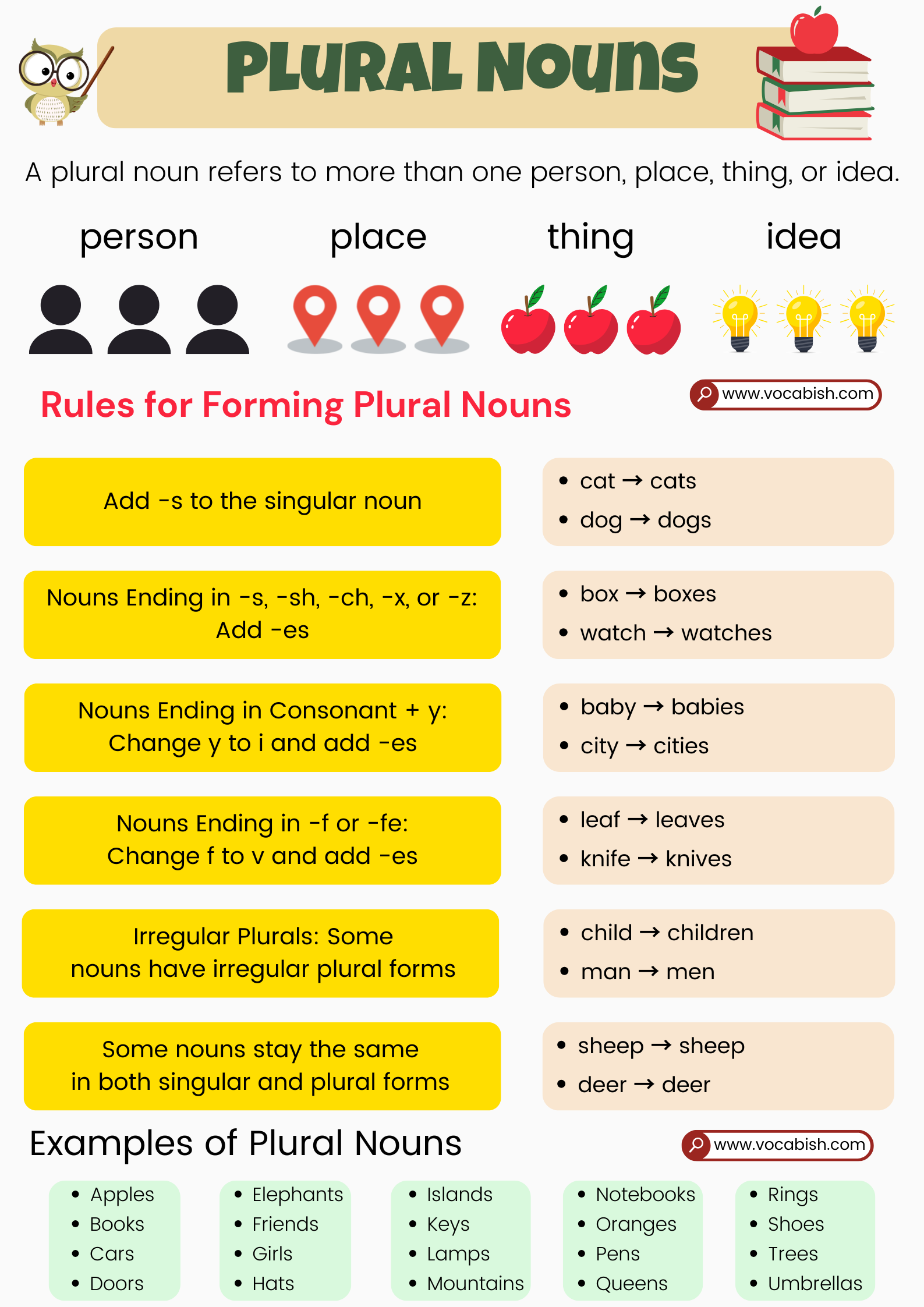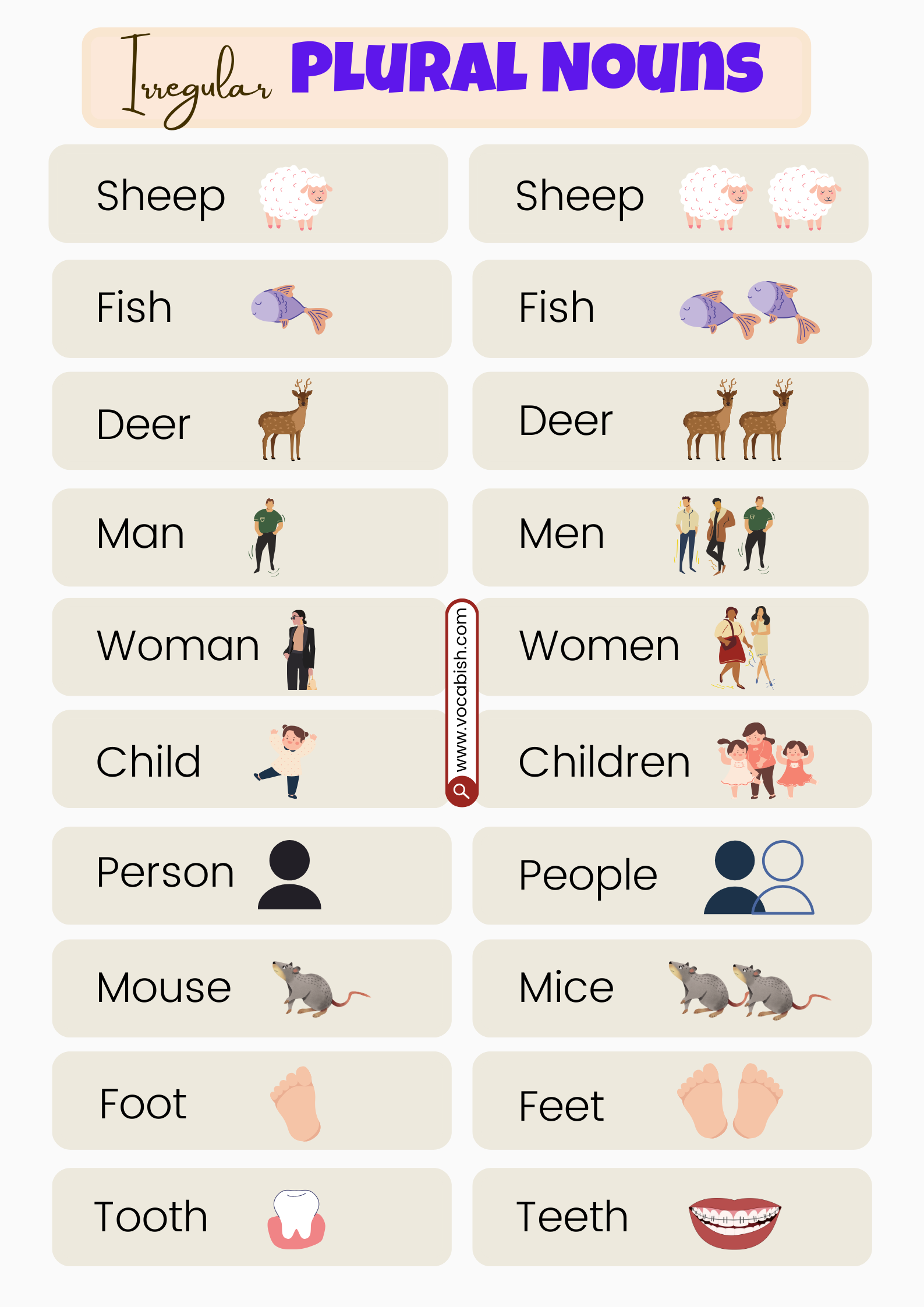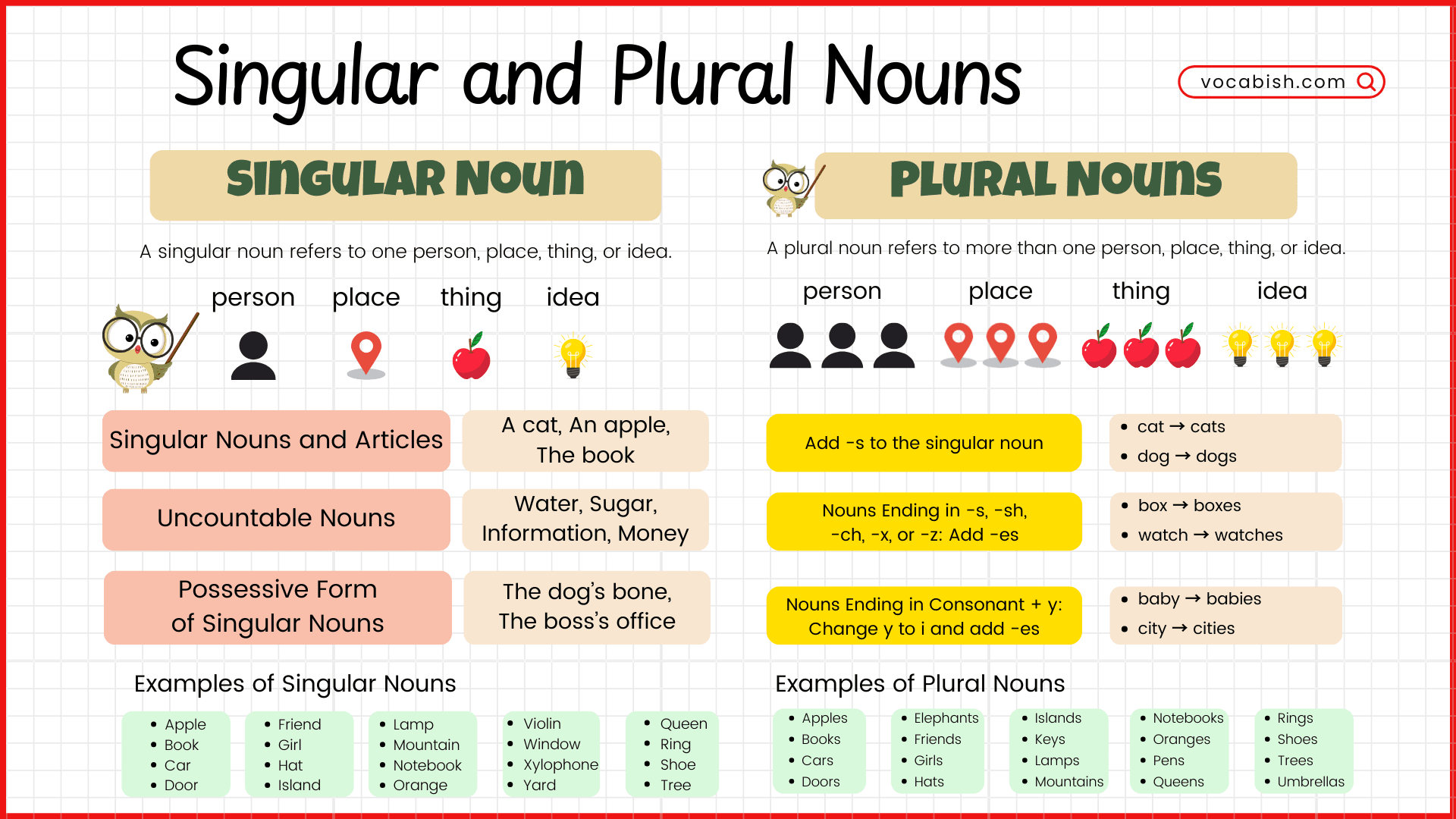In this blog post, you will learn how to use singular and plural nouns in English. Singular nouns name one person, place, thing, or idea, like book or child, while plural nouns name more than one, like books or children. Understanding singular and plural forms is important because it helps you master grammar, speak correctly, write accurately, and understand English more easily. By exploring the 100 lists of singular and plural nouns, you can see how nouns change from singular to plural and use them confidently in your everyday English.
What is a Singular Noun?
A singular noun refers to one person, place, thing, or idea.
Examples of Singular Nouns:
- Dog
- Car
- House
- Book
- Tree
- Table
- Cat
- Pen
- Child
- Man
Singular Noun Sentences:
- The dog is barking.
- She has a car.
- The house is big.
- He read a book.
- A tree fell in the storm.
Important Points to Learn About Singular Nouns
| Description | Examples | |
|---|---|---|
| Singular Nouns and Articles | Singular nouns are often used with articles “a”, “an”, or “the”. | A cat, An apple, The book |
| Uncountable Nouns | Some nouns exist only in singular form (uncountable), and they do not have plural forms. | Water, Sugar, Information, Money, Rice |
| Possessive Form of Singular Nouns | Show possession by adding ‘s to the singular noun, or just an apostrophe if it ends in -s. | The dog’s bone, The boss’s office (or boss’ office) |
| Singular Nouns and Verbs | Singular nouns take singular verbs, often with an -s in the present tense. | The boy runs fast, The car drives smoothly |
| Collective Nouns | Collective nouns refer to a group but are treated as singular. | Team, Family, Class, Group |

What is a Plural Noun?
A plural noun refers to more than one person, place, thing, or idea.
Examples of Plural Nouns:
- Dogs
- Cars
- Houses
- Books
- Trees
- Tables
- Cats
- Pens
- Children
- Men
Plural Noun Sentences:
- The dogs are barking.
- They have two cars.
- The houses are new.
- He bought many books.
- The trees are tall.
Rules for Forming Plural Nouns
Most Nouns: Add -s to the singular noun.
- Singular: cat → Plural: cats
- Singular: dog → Plural: dogs
Nouns Ending in -s, -sh, -ch, -x, or -z: Add -es.
- Singular: box → Plural: boxes
- Singular: watch → Plural: watches
Nouns Ending in Consonant + y: Change y to i and add -es.
- Singular: baby → Plural: babies
- Singular: city → Plural: cities
Nouns Ending in -f or -fe: Change f to v and add -es.
- Singular: leaf → Plural: leaves
- Singular: knife → Plural: knives
Irregular Plurals: Some nouns have irregular plural forms.
- Singular: child → Plural: children
- Singular: man → Plural: men
Nouns That Do Not Change: Some nouns stay the same in both singular and plural forms.
- Singular: sheep → Plural: sheep
- Singular: deer → Plural: deer

100 Examples of Singular Nouns
- Apple
- Book
- Car
- Door
- Elephant
- Friend
- Girl
- Hat
- Island
- Key
- Lamp
- Mountain
- Notebook
- Orange
- Pen
- Queen
- Ring
- Shoe
- Tree
- Umbrella
- Violin
- Window
- Xylophone
- Yard
- Zebra
- Bag
- Coin
- Dress
- Egg
- Fork
- Gift
- Hill
- Ice
- Juice
- Kite
- Lion
- Moon
- Nest
- Ocean
- Pillow
- Quilt
- Road
- Sun
- Turtle
- Vase
- Whale
- Yardstick
- Zipper
- Airplane
- Bear
- Candle
- Doll
- Eggplant
- Frog
- Grass
- House
- Insect
- Jar
- Kitten
- Ladder
- Magnet
- Nest
- Owl
- Pencil
- Queen
- Rope
- Spoon
- Tent
- Unicorn
- Volcano
- Wolf
- X-ray
- Yacht
- Zucchini
- Actor
- Ball
- Cat
- Desk
- Eagle
- Flag
- Gate
- Heart
- Ink
- Jar
- Kite
- Lamp
- Mouse
- Nut
- Oven
- Pot
- Quilt
- Robot
- Star
- Table
- Unicorn
- Van
- Wheel
- Xylophone
- Yardstick
- Zipper
100 Examples of Plural Nouns
- Apples
- Books
- Cars
- Doors
- Elephants
- Friends
- Girls
- Hats
- Islands
- Keys
- Lamps
- Mountains
- Notebooks
- Oranges
- Pens
- Queens
- Rings
- Shoes
- Trees
- Umbrellas
- Violins
- Windows
- Xylophones
- Yards
- Zebras
- Bags
- Coins
- Dresses
- Eggs
- Forks
- Gifts
- Hills
- Ice cubes
- Juices
- Kites
- Lions
- Moons
- Nests
- Oceans
- Pillows
- Quilts
- Roads
- Suns
- Turtles
- Vases
- Whales
- Yardsticks
- Zippers
- Airplanes
- Bears
- Candles
- Dolls
- Eggplants
- Frogs
- Grasses
- Houses
- Insects
- Jars
- Kittens
- Ladders
- Magnets
- Nests
- Owls
- Pencils
- Queens
- Ropes
- Spoons
- Tents
- Unicorns
- Volcanoes
- Wolves
- X-rays
- Yachts
- Zucchinis
- Actors
- Balls
- Cats
- Desks
- Eagles
- Flags
- Gates
- Hearts
- Inks
- Jars
- Kites
- Lamps
- Mice
- Nuts
- Ovens
- Pots
- Quilts
- Robots
- Stars
- Tables
- Unicorns
- Vans
- Wheels
- Xylophones
- Yardsticks
- Zippers
Difference between Regular and Irregular Plural Nouns
Here’s the difference between regular and irregular plural nouns along with examples:
| Type | Rule | Singular Example | Plural Example |
|---|---|---|---|
| Regular Plural | Formed by adding -s or -es to the singular noun. | Cat | Cats |
| For nouns ending in -s, -x, -ch, -sh, or -z, add -es. | Box | Boxes | |
| If the noun ends in a consonant + y, change y to i and add -es. | Baby | Babies | |
| Irregular Plural | Does not follow a specific rule. Plural forms vary and may completely change the word or stay the same. | Child | Children |
| Some nouns have the same singular and plural form. | Sheep | Sheep |
Examples of Regular Plural Nouns
- Dog → Dogs
- Book → Books
- Car → Cars
- Apple → Apples
- Table → Tables
- Box → Boxes
- Watch → Watches
- Bus → Buses
- Bush → Bushes
- Dress → Dresses
- Baby → Babies
- Lady → Ladies
- City → Cities
- Toy → Toys
- Pen → Pens
- Chair → Chairs
- Door → Doors
- Ball → Balls
- Tree → Trees
- Hat → Hats
Examples of Irregular Plural Nouns
- Child → Children
- Man → Men
- Woman → Women
- Foot → Feet
- Tooth → Teeth
- Mouse → Mice
- Goose → Geese
- Person → People
- Ox → Oxen
- Louse → Lice
- Sheep → Sheep
- Fish → Fish
- Deer → Deer
- Cactus → Cacti
- Radius → Radii
- Crisis → Crises
- Analysis → Analyses
- Leaf → Leaves
- Wolf → Wolves
- Knife → Knives

Practice Exercise for Singular Nouns
Fill in the blanks with the correct singular noun and article (a, an, the).
- _____ book is on the table.
- _____ cat is sleeping under the chair.
- _____ apple is on the kitchen counter.
- _____ teacher gave us homework.
- I saw _____ interesting movie yesterday.
Answers:
- The book is on the table.
- The cat is sleeping under the chair.
- An apple is on the kitchen counter.
- The teacher gave us homework.
- I saw an interesting movie yesterday.
Practice Exercise for Plural Nouns
Convert these singular nouns to plural:
- Box → _______
- Man → _______
- Baby → _______
- Leaf → _______
- Bus → _______
Answers:
- Boxes
- Men
- Babies
- Leaves
- Buses
Learning singular and plural nouns in English is simple when you know the rules. Practicing with examples and exercises will help you master this important part of grammar.

